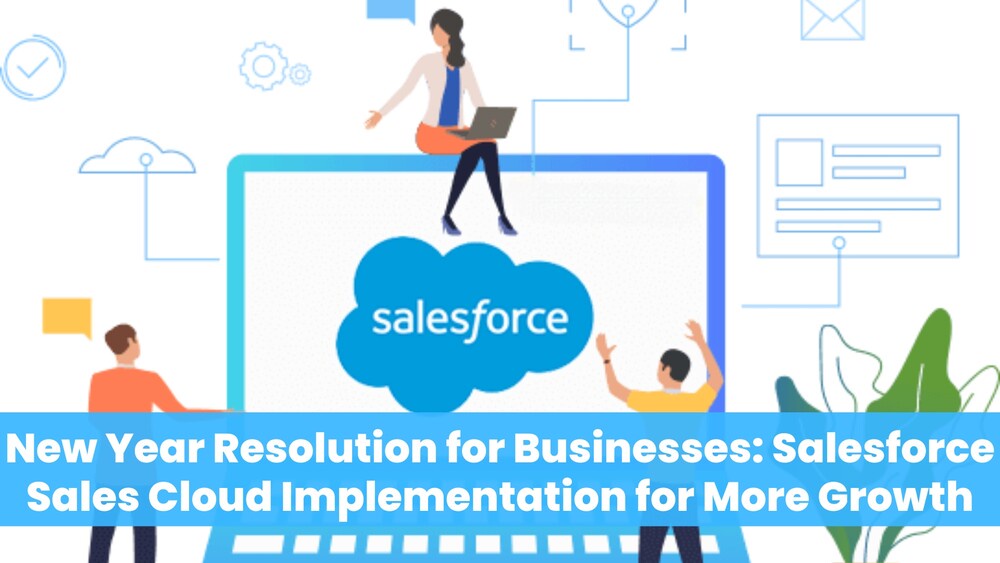As businesses embrace the new year, it's time to set resolutions that pave the way for growth, efficiency, and enhanced customer satisfaction. One impactful resolution that businesses can consider is the implementation of Salesforce Sales Cloud. In this blog post, we will explore the significance of Salesforce Sales Cloud solutions and why its implementation can be a game-changer for businesses aiming for more growth in the coming year.
Understanding Salesforce Sales Cloud
Salesforce Sales Cloud is the flagship product of Salesforce, a leading customer relationship management (CRM) platform. It is designed to streamline and optimize the entire sales process, from lead generation to deal closure and ongoing customer relationship management. With a suite of tools and features, Salesforce Sales Cloud empowers businesses to sell smarter and faster, driving increased revenue and customer satisfaction.
Why Choose Salesforce Sales Cloud?
1. 360-Degree Customer View
One of the key advantages of Salesforce Sales Cloud is its ability to provide a 360-degree view of your customers. It centralizes customer information, interactions, and transaction history, enabling sales teams to have a comprehensive understanding of each customer. This holistic view enhances customer engagement and allows for more personalized and targeted sales strategies.
2. Lead Management and Automation
Salesforce Sales Cloud offers robust lead management capabilities. Businesses can efficiently capture, track, and nurture leads through automated workflows. Automation ensures that leads are prioritized, assigned to the right sales representatives, and followed up on in a timely manner, reducing manual effort and accelerating the sales cycle.
3. Opportunity and Pipeline Management
Managing opportunities and sales pipelines becomes seamless with Salesforce Sales Cloud solutions. The platform allows businesses to track every stage of the sales process, from initial contact to deal closure. Real-time visibility into the sales pipeline enables better decision-making, resource allocation, and forecasting.
4. Enhanced Communication and Collaboration
Salesforce Sales Cloud fosters collaboration among sales teams by providing a centralized platform for communication. Features like Chatter enable real-time collaboration, ensuring that team members can share insights, updates, and relevant information instantly. This collaborative environment contributes to a more efficient and aligned sales team.
5. Mobile Accessibility
In the modern business landscape, mobility is crucial. Salesforce Sales Cloud offers mobile accessibility, allowing sales representatives to access customer information, update records, and manage tasks on the go. This flexibility not only enhances productivity but also ensures that sales teams are always well-informed and responsive.
6. AI-powered Insights with Einstein Analytics
Salesforce's Einstein Analytics, integrated into Sales Cloud, brings the power of artificial intelligence (AI) to sales teams. It provides actionable insights, predictive analytics, and intelligent recommendations based on historical data and customer behavior. This AI-driven approach empowers sales professionals to make informed decisions and prioritize high-value opportunities.
7. Scalability and Customization
Salesforce Sales Cloud is highly scalable and can adapt to the evolving needs of businesses. Whether you're a small startup or a large enterprise, the platform can be customized to align with your specific sales processes and requirements. This flexibility ensures that Salesforce Sales Cloud grows with your business.
Implementation Process
Now that we understand the benefits of Salesforce Sales Cloud, let's delve into the implementation process. While each business is unique, a general roadmap for Salesforce Sales Cloud implementation involves the following steps:
1. Assessment and Planning
Begin by conducting a thorough assessment of your current sales processes, challenges, and goals. Identify key stakeholders and gather their input. With a clear understanding of your business requirements, create a detailed implementation plan that outlines objectives, timelines, and milestones.
2. Data Migration and Cleansing
Clean and migrate existing data to Salesforce Sales Cloud. Data accuracy is crucial for the success of the implementation. Take this opportunity to cleanse and organize your data to ensure that the platform starts with accurate and reliable information.
3. Customization and Configuration
Tailor Salesforce Sales Cloud to meet your business needs. Customize fields, workflows, and page layouts to align with your specific sales processes. Leverage the platform's flexibility to create a personalized environment for your sales teams.
4. Integration with Existing Systems
If your business utilizes other systems or applications, ensure seamless integration with Salesforce Sales Cloud. This includes integrating with marketing automation tools, ERP systems, and any other relevant platforms. Integration enhances data flow and avoids silos, providing a unified view of your business processes.
5. User Training
A successful Salesforce Sales Cloud implementation involves proper training for your sales teams. Ensure that users are well-versed in navigating the platform, entering data, and leveraging its features. Salesforce provides training resources and documentation, and you may also consider organizing hands-on training sessions for a smoother transition.
6. Rollout and Adoption
Gradually roll out Salesforce Sales Cloud to your teams, starting with a pilot group if needed. Monitor user adoption and address any challenges or concerns. Encourage feedback and iterate on the implementation based on user experiences.
7. Ongoing Support and Optimization
Salesforce Sales Cloud is not a one-time implementation; it's an evolving solution. Provide ongoing support, address user queries, and continually optimize the platform based on feedback and changing business needs. Regularly review and update configurations to ensure that Salesforce Sales Cloud remains aligned with your business objectives.
Conclusion
In conclusion, making Salesforce Sales Cloud implementation a New Year resolution for your business can set the stage for unprecedented growth and success. The platform's comprehensive features, customization options, and scalability make it a valuable asset for businesses of all sizes and industries. By streamlining sales processes, fostering collaboration, and leveraging AI-powered insights, Salesforce Sales Cloud empowers your teams to sell smarter and achieve remarkable results. Embrace the new year with a commitment to enhancing your sales capabilities and unlocking the full potential of your business with Salesforce Sales Cloud.


No comments yet